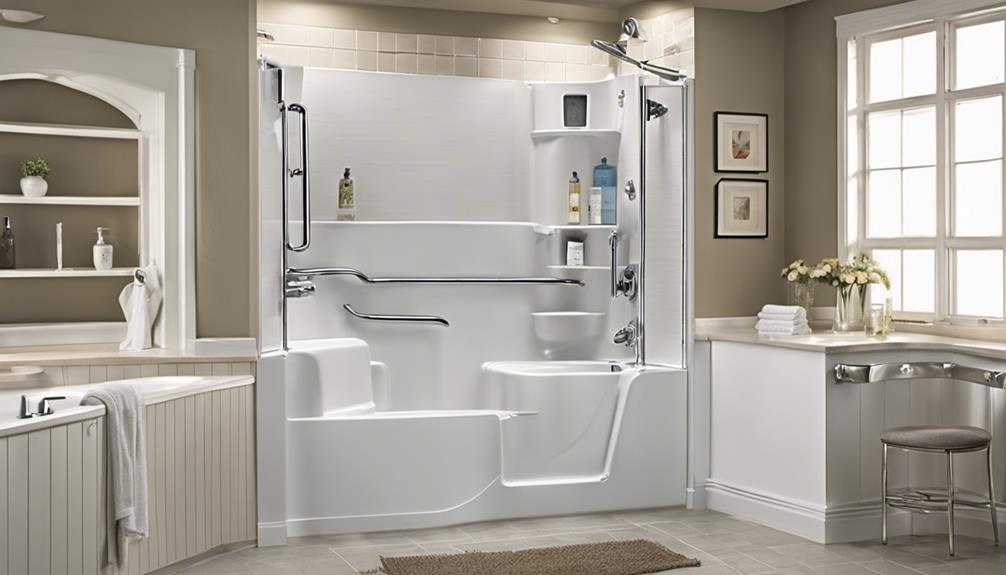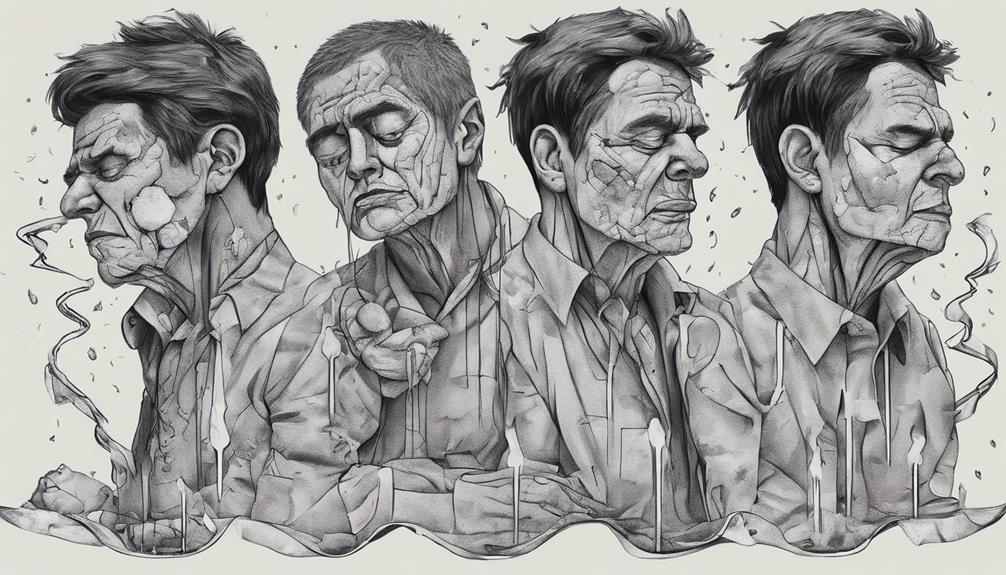Humor plays a crucial role in dementia care, promoting joy and fostering connections. When incorporating memes, it is essential to ensure they are appropriate and sensitive. Seek out humor that is relatable and easily understandable, such as slapstick, to effectively engage individuals with varying cognitive abilities. It is important to pay attention to their reactions and adapt accordingly to ensure their comfort. Sharing laughter can help reduce stress for both caregivers and patients. Remember, humor should create a welcoming environment free from anxiety. By delving deeper, you can uncover additional strategies to enhance your use of humor in dementia care.
Key Takeaways
- Memes should be tailored to the cognitive abilities and preferences of individuals with dementia to ensure understanding and enjoyment.
- Humor in memes must be appropriate and sensitive, avoiding potentially triggering content that may cause discomfort.
- Positive and relatable memes can foster community and connection among caregivers and those with dementia, enhancing emotional support.
- Caregivers should solicit feedback on meme appropriateness to align humor with the comfort levels of individuals in their care.
- Observing humor preferences helps caregivers create meaningful interactions, enhancing emotional connections through laughter.
Understanding Humor in Dementia
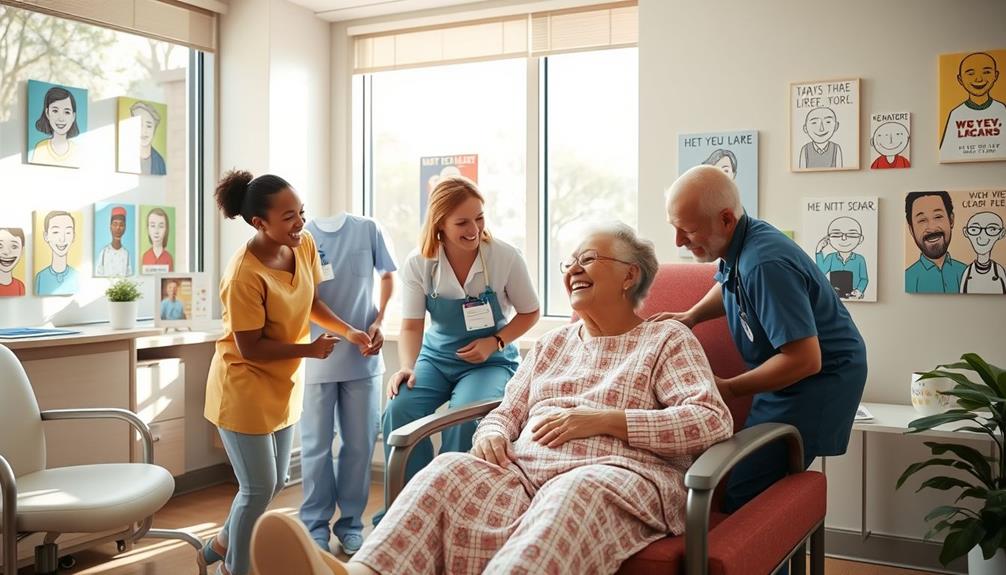
Understanding humor in dementia can be both enlightening and challenging. As you interact with people living with dementia, you'll notice that their sense of humor often shifts due to cognitive impairment. Traditional jokes with setups and punchlines can become confusing, making it hard for them to appreciate humor in that form.
Instead, slapstick comedy tends to resonate more, as it relies on physical humor that doesn't require complex cognitive processing. By celebrating love and legacy through heartfelt memories, you can create moments of joy that resonate deeply.
You might find that amusement often arises from unexpected or absurd situations, highlighting that laughter can still thrive even amidst cognitive decline. As a care partner, your role is vital in recognizing and creating these humorous moments.
However, it's important to approach humor thoughtfully. Balancing humor in dementia care means ensuring it fosters comfort and joy without overwhelming the individual.
Observing when laughter emerges during social interactions can be incredibly rewarding. Yet, you must remain sensitive to the boundaries that could lead to discomfort or anxiety.
Benefits of Humor Therapy
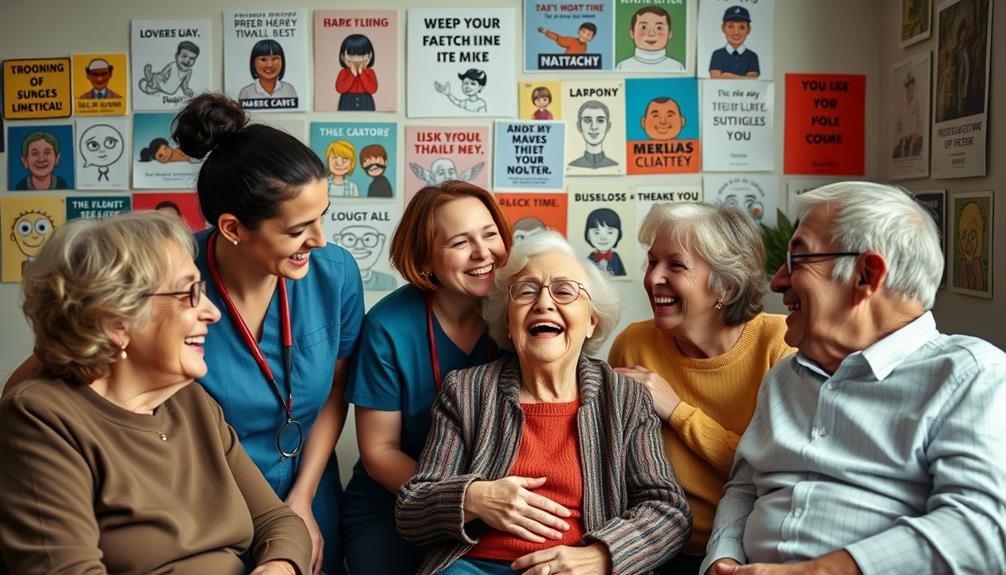
Humor therapy offers a powerful tool for enhancing the well-being of individuals with dementia. By incorporating laughter into care routines, you can greatly impact dementia patients' mental and emotional states. Research shows that humor therapy can relieve symptoms of anxiety and depression, matching the effectiveness of antipsychotic medications but without the side effects. Additionally, humor therapy can foster social interaction and strengthen the bond between caregivers and patients, which is essential for emotional support. Similarly, incorporating activities like pet therapy has shown remarkable benefits, as pets improve senior wellbeing by reducing stress and promoting a sense of companionship. Together, both humor and pet therapies provide holistic care, contributing to a better quality of life for dementia patients.
When you share a laugh, endorphins are released, boosting mood and fostering a sense of well-being, even amid cognitive decline. Additionally, curiosity and happiness can be intertwined with humor, as engaging in playful interactions promotes exploration and connection, further enhancing emotional support.
Moreover, laughter lowers cortisol levels, helping reduce stress for both caregivers and patients. This natural form of stress relief reinforces the idea that "laughter is the best medicine."
As a caregiver, promoting humor not only enriches the lives of dementia patients but also enhances your own quality of life. Engaging in humor therapy can lead to improved cardiovascular health, increased pain tolerance, and even a stronger immune system.
Additionally, the social factors involved in sharing a laugh create connections that are crucial for emotional support. Ultimately, humor therapy is a simple yet effective way to enhance the overall care experience for everyone involved.
Engaging Humor Techniques
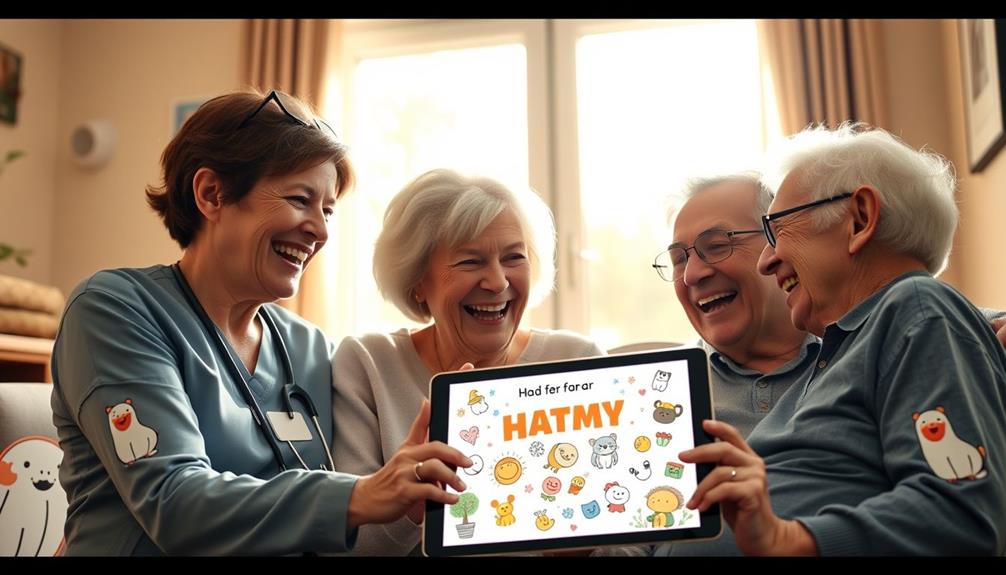
Effective humor techniques can transform your interactions with individuals living with dementia, creating moments of joy and connection. By focusing on high-energy moments in distraction-free environments, you can foster positive interactions. Use relaxed body language and maintain comfortable proximity to build trust and safety.
Here's a quick summary of engaging humor techniques:
| Technique | Description | Benefits |
|---|---|---|
| Slapstick Comedy | Use physical humor or absurd situations | Easy to understand and enjoy |
| Caregiver Observation | Watch for spontaneous humorous moments | Tailors humor to the individual's mood |
| Allowing Response Time | Give time for responses to accommodate cognitive pace | Enhances engagement and connection |
| Relaxed Body Language | Maintain a comfortable posture and space | Creates a welcoming atmosphere |
| Humorous Exchanges | Encourage light-hearted conversations | Promotes laughter and connection |
Responsible Use of Memes

Using humor in dementia care can extend beyond physical antics and light-hearted conversations to include the vibrant world of memes. Memes can engage people with dementia, offering a unique way to connect. However, as a caregiver, you must guarantee the humor is appropriate and sensitive to the context of dementia. This means avoiding potentially triggering content that could provoke anxiety or confusion.
Incorporating humor can also be linked to personality traits found in astrological compatibility, which may enhance the emotional connection during interactions. Research shows that humor, including memes, provides emotional relief and enhances social interaction. To be effective, tailor the memes to the cognitive abilities and preferences of those you're engaging with. Seek out memes that promote positive and relatable experiences, fostering a sense of community among caregivers and individuals with dementia.
It's also essential to solicit feedback from the people involved. Understanding their perceptions of humor in memes will help you guarantee the content aligns with their comfort levels, ultimately enhancing their well-being.
Caregiver Support and Strategies

While caring for individuals with dementia can be rewarding, it often comes with its unique set of challenges, particularly when managing humor. To navigate these situations effectively, you need caregiver support and practical strategies that enhance your caregiving experience.
In this situation, fostering a digital-friendly environment at home can also contribute to maintaining a light-hearted atmosphere and engaging interactions with your loved one, making use of creative projects that inspire laughter and connection.
Here are some approaches to reflect on:
- Observe humor preferences: Understanding what makes your patient laugh can improve emotional connections and social interactions.
- Implement psychological strategies: Techniques like meditation and deep breathing help manage discomfort from inappropriate humor episodes.
- Use distraction methods: Redirecting attention can alleviate tension when humor turns dark.
- Establish community support: Connect with other caregivers through support groups to share experiences and gain insights on humor in dementia care.
- Maintain a calm demeanor: Avoiding triggering environments can minimize uncomfortable humor and promote well-being.
Frequently Asked Questions
What Are the Three Golden Rules of Dementia?
The three golden rules of dementia care are person-centered care, adapting communication styles, and creating a safe environment. These principles help you guarantee individuals feel valued, understood, and secure, enhancing their overall well-being.
What Are Three Things to Never Do With Your Loved One With Dementia?
When caring for loved ones with dementia, don't disregard their emotions, dismiss their confusion, or demand participation. Instead, prioritize patience, understanding, and gentle engagement to nurture their dignity and enhance their well-being.
What Is the Number One Trigger for Dementia Behavior?
The number one trigger for dementia behavior is often environmental changes. You'll notice that altering routines or surroundings can lead to confusion and agitation, making it essential to maintain a familiar and comforting atmosphere.
What Are the Four R's of Dementia Care?
The Four R's of dementia care are Respect, Reassurance, Routine, and Recognition. You'll create a supportive environment, help reduce anxiety, provide structure, and acknowledge the individual's abilities, enhancing their dignity and engagement throughout their journey.
Conclusion
In the end, you might think humor is just about laughter, but in dementia care, it's a lifeline. By embracing the right memes and techniques, you can create moments of joy that cut through confusion. Ironically, while dementia may cloud memories, humor can shine a light in the darkness. So, as you navigate this journey, remember that a good chuckle might just be the most profound connection you can offer. Keep laughing—it's the best medicine!


